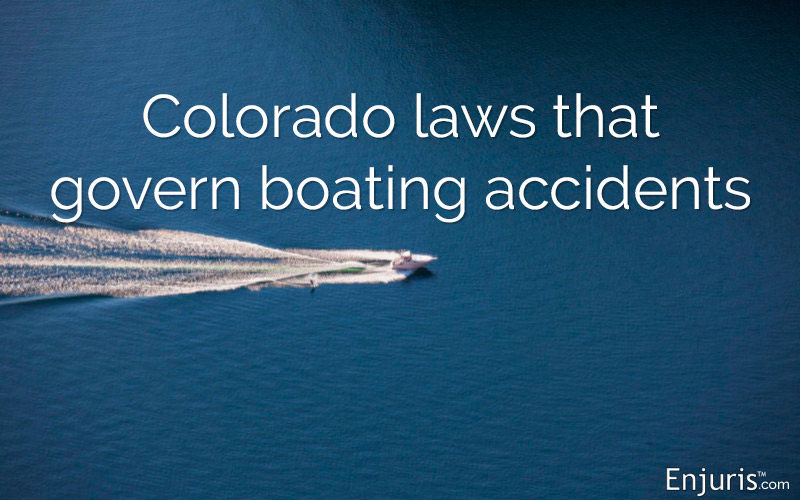Admiralty law and how it affects your boat or watercraft
Colorado is a landlocked state – so why would it need maritime laws?
Maritime law (also called admiralty law) is the body of law that governs the entities that operate vessels on the oceans and open waters. This could range from insurance claims to personal injuries to civil matters on a cruise ship – or piracy. If Poseidon were real, he would be the head of the governing body, the International Maritime Organization.
Maritime law also regulates licensing and inspection procedures for boats and shipping contracts. There are 171 member states responsible for the enforcement of IMO conventions, and local governments set penalties for infringement. Ships even have their own nationality from where they were registered.
Surprisingly, the Coast Guard has a post in Colorado despite being surrounded by other states. (Granted, their motto is “Semper paratus,” which in English means “Always ready.”)
So what about Colorado?
Even though they’re landlocked, Colorado’s areas of water must be regulated for both business and recreation. Plus, think of all the different types of boats that need monitoring: There are air boats, tugboats, kayaks, watercrafts, jet skis, wave runners, yatchs, power boats, motorboats, diving boats, inflatable boats... You get the idea.
Colorado Parks & Wildlife has enacted vessel registration regulations and various laws that are updated regularly in the Boating Statutes & Regulations Handbook.
Vessels must be registered with the local tax collector’s office before use. There are also many other internal state laws, including:
- The reporting of accidents that result in injury, death, or more than $500 in property damage;
- Automotive-style factory mufflers for airboats;
- Vessel speed restrictions;
- Laws regarding boating under the influence (discussed in more detail below);
- Those under the age of 16 cannot operate a vehicle;
- And more.
The one thing that remains constant is that the laws are always changing – so make sure to check the current regulations before setting sail.
Who can be held liable if I am hurt while boating?
Sorry, but this is going to be your typical lawyer answer: “It depends.”
These situations depend on the circumstances of the accident. They can include multiple defendants, such as the driver or owner of the boat (if you were a passenger); the driver or owner of the boat that hit yours; the manufacturer of the boat; the manufacturers of any defective flotation devices; the owner of the dock; and anyone else who negligently contributed to your injuries.
What if I signed a waiver that disclaimed liability?
It is almost guaranteed that if you rent a boat from a dock or marina-owner, you will have to sign a disclaimer of liability prior to putting that boat in the water. These documents try to heap any blame back on you, should you find yourself injured while using the borrowed watercraft.
Depending on the circumstances, this contract might not be enforceable. The contract language will need to be examined by a qualified attorney, as well as the conditions under which the contract was signed. Don’t lose hope just yet.
Drunk boating in Colorado
It is illegal in Colorado to operate a boat while under the influence of alcohol. This knowledge doesn’t stop people from trying it, regardless. Water might seem like it would be softer to hit during a high-speed crash, but trust us, it hurts just the same.
Colorado recently amended its DUI laws, reducing the limit on the state’s blood alcohol limit at which an individual is considered intoxicated from 0.10 to .08, making it consistent with motor vehicle laws. Colorado Park & Wildlife has worked very hard to impart how seriously people should take drinking while boating, because:
- A boater who is intoxicated is 10 times more likely to be killed in an accident than a boater who is not;
- In private data, 13% of boat accidents involved the use of alcohol or drugs;
- Approximately 89% had no, or no known, boating education.
- Approximately 75% of victims died from drowning, and 40% of victims were not wearing a life jacket.
Colorado Parks & Wildlife puts it best by saying that drinking and boating is as dangerous, if not more dangerous, than drinking and driving:
This is because in addition to the negative effects on judgment, vision, balance, coordination and reaction times associated with alcohol consumption, water creates an even more hazardous environment due to the: motion of the boat and waves, wake and current; vibration of the boat; noise from motors; sun; glare; wind; and spray. Also keep in mind that boats are a lot different from vehicles since they steer from the rear, they have no brakes and there is no designated lanes or traffic control devices.
If you’re a boating enthusiast who needs to speak with an attorney, try the Enjuris Colorado law firm directory!
See our guide Choosing a personal injury attorney.


